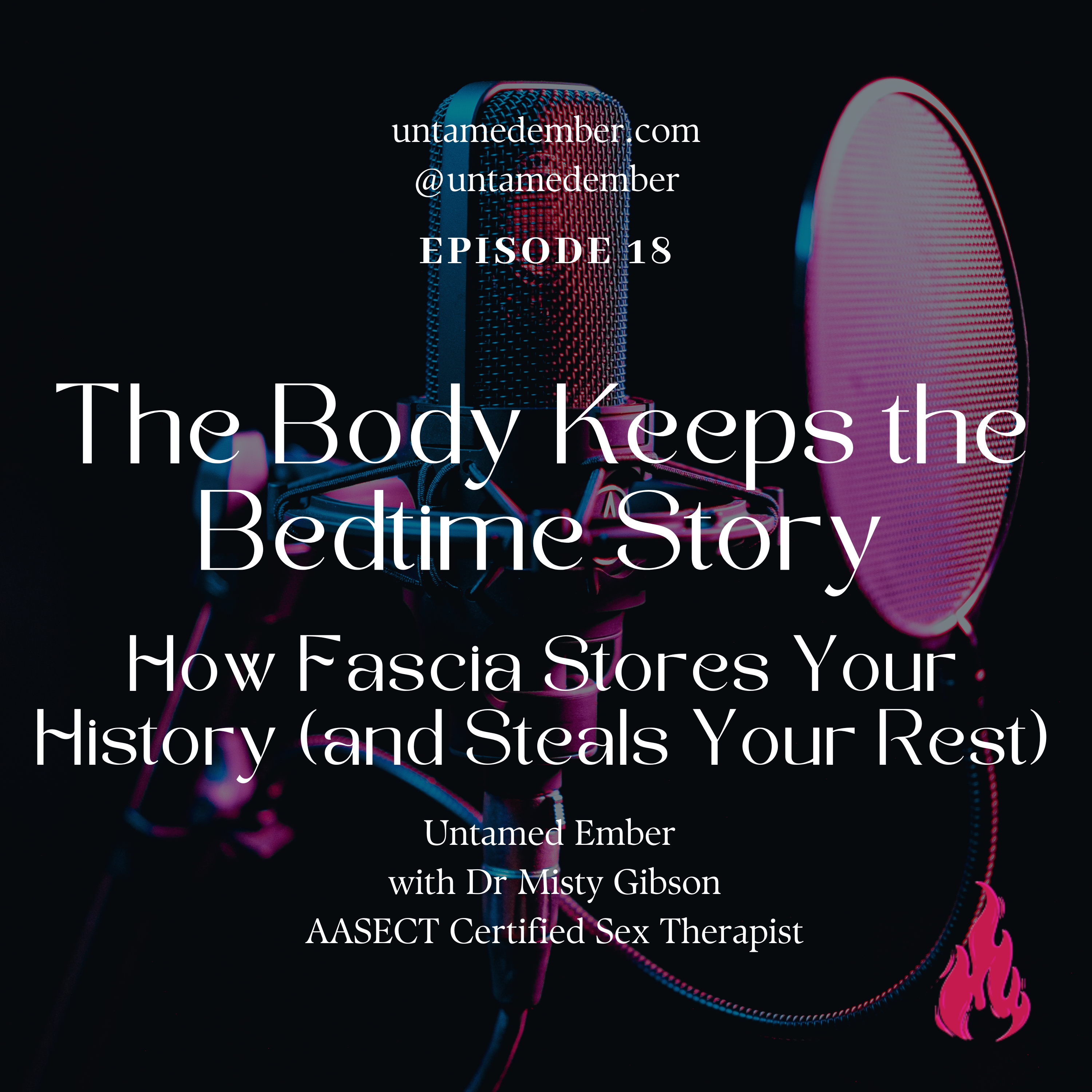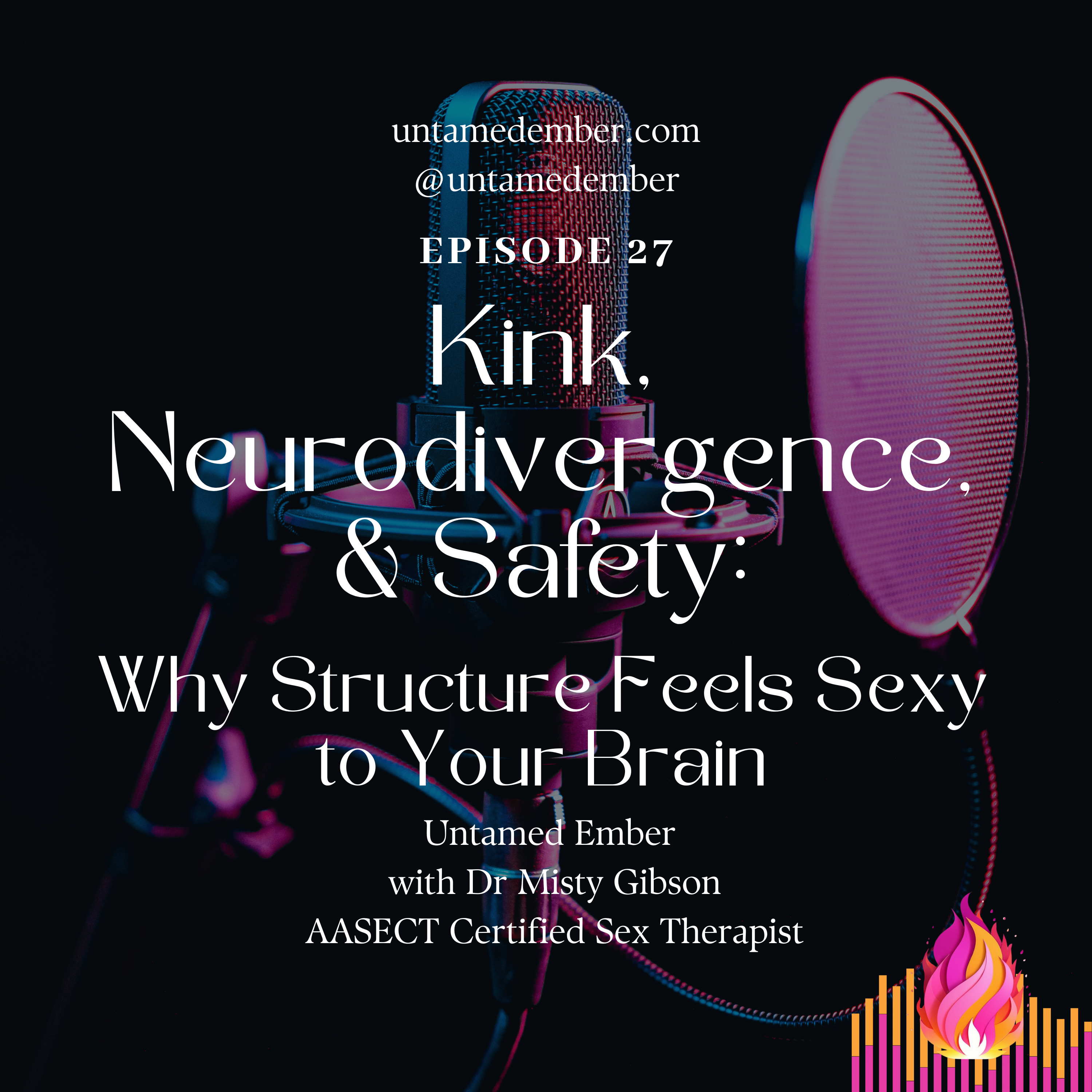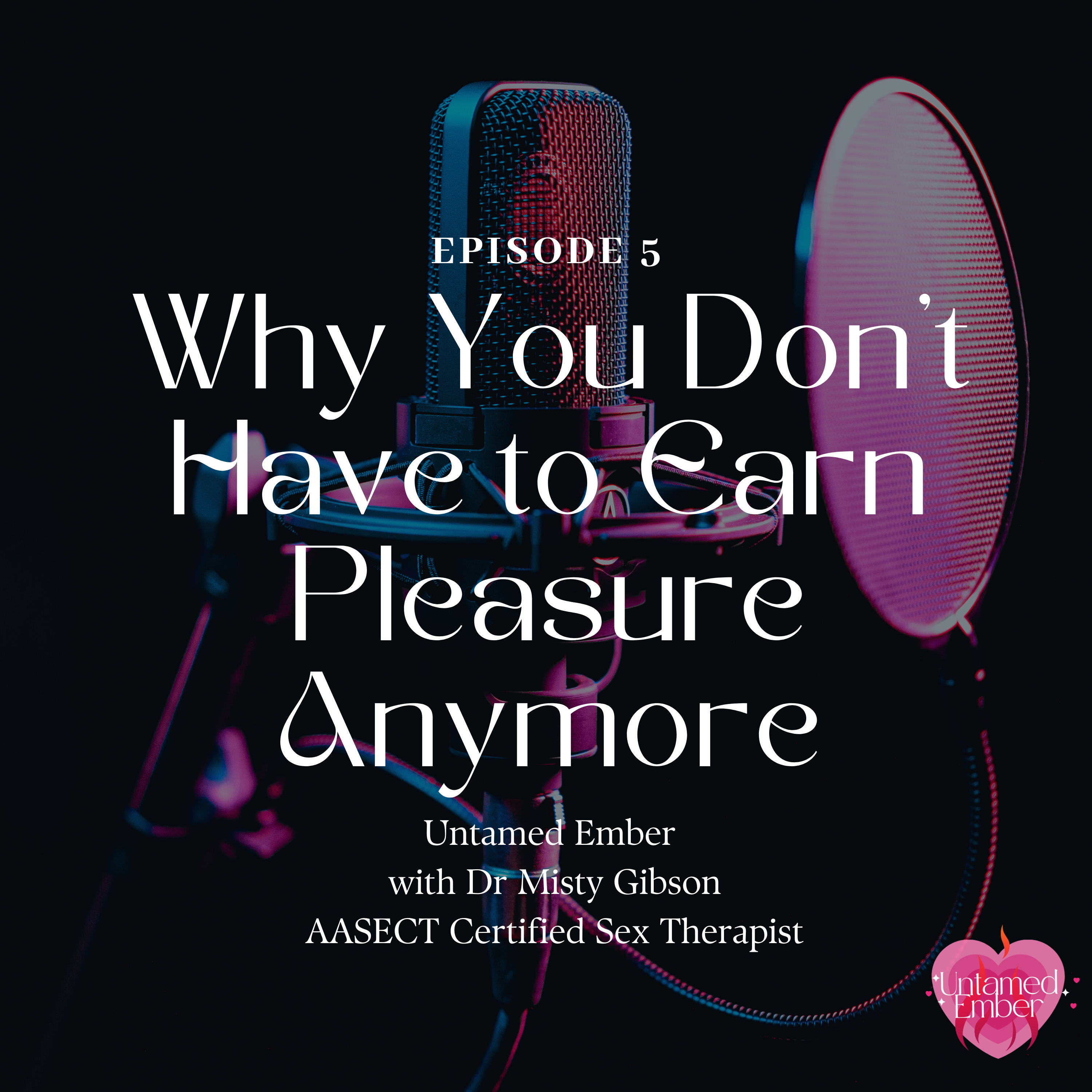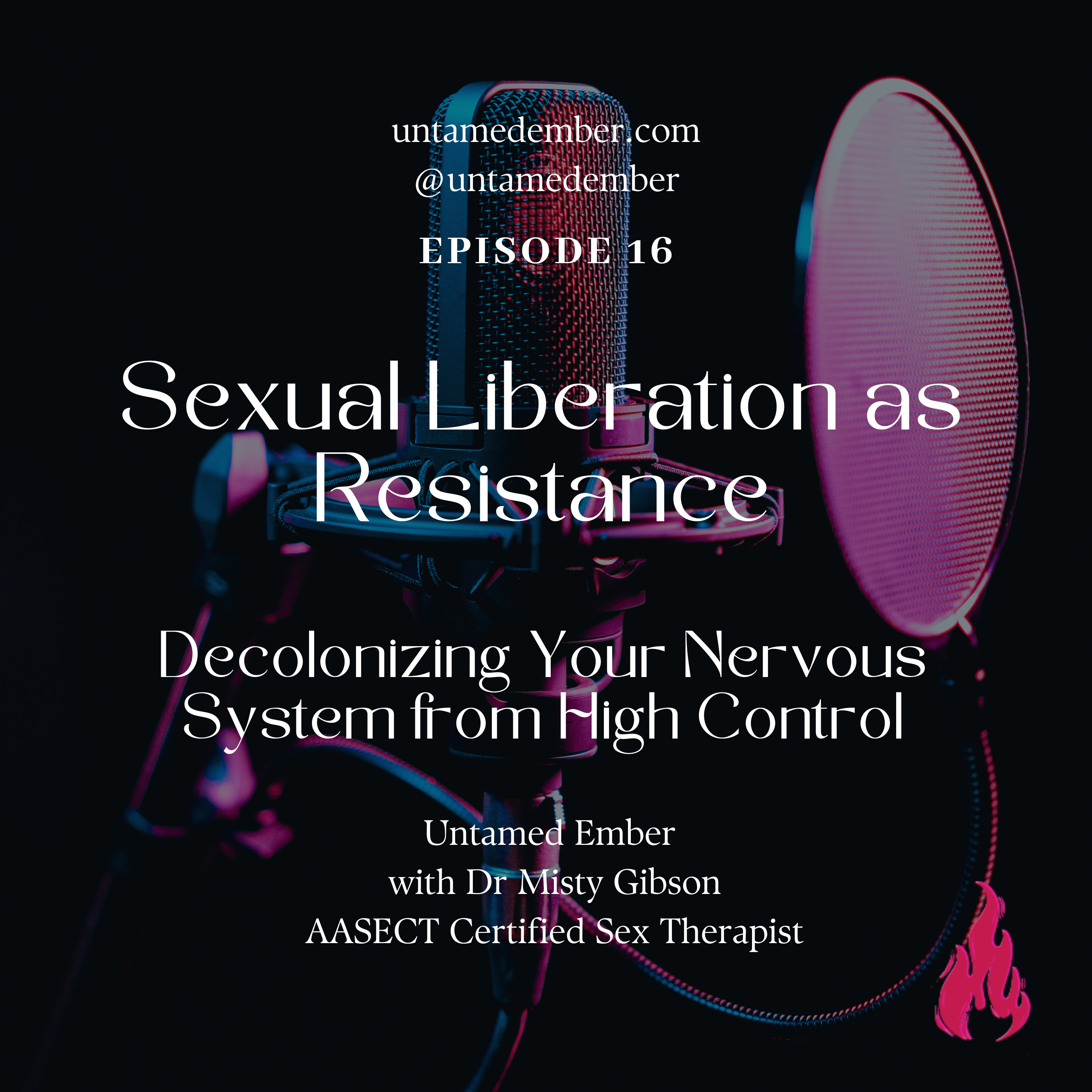Episode Transcript
[00:00:03] You think it's just your hip flexors being tight, but then someone touches your lower back in a yoga class and suddenly you're crying over something from 2008 that you thought you'd long forgotten. Or maybe you're finally getting that massage you've been desperate for, and the moment they press into your shoulders, your throat closes up with grief that came from absolutely nowhere.
[00:00:24] Or perhaps you're lying in bed trying to sleep, just like we talked about last time, and there's this ache in your jaw, your hips, your chest that no amount of stretching ever seems to fix.
[00:00:37] If any of these moments sound familiar, today's episode is about to blow your mind.
[00:00:43] Hey, loves. Welcome back to another episode of untamed ember. I'm Dr. Misty. Where we talk about sex, shame, the nervous system, and why that knot in your shoulder probably isn't from your laptop posture.
[00:00:56] Last time we dove into the polyvagal paradox, why your body can't sleep even when you're finally safe.
[00:01:03] Today, we're taking that exploration one layer deeper into the tissue that's literally holding those sleep struggles in place. Your fascia.
[00:01:13] If you've ever wondered why your body seems to be keeping score of every slight stress and shutdown you've ever experienced, why certain touch brings up emotions you thought you'd processed years ago, or why you can't seem to find comfort no matter how many stretches or sleep positions you try, this episode is your permission slip to finally understand what your body's been trying to tell you.
[00:01:37] Here's what I've learned after years of working with bodies of all kinds. If your body could talk, your fascia would be the keeper of all the secrets you never felt safe enough to say out loud.
[00:01:50] So what the fuck is fascia? Before we dive into how fascia stores your emotional baggage better than your therapist's notes, let's start with the basics. What the hell even is fascia?
[00:02:01] So first, let me ruin chicken for you. If you've ever prepared chicken for cooking and you notice that thin, translucent white film between the skin and the meat, or that silvery coating that wraps around muscles, and that's fascia. But don't worry, your fascia is way sexier than raw chicken.
[00:02:19] Fascia is essentially a three dimensional web of connective tissue that wraps around every muscle, every bone, nerve, artery and organ in your entire body. Like a full body spider web woven into your structure.
[00:02:33] It's a continuous system, which means the fascia in your jaw is connected to the fascia in your pelvis, which is connected to the fascia in your feet, it's literally the physical embodiment of being all connected.
[00:02:46] But fascia isn't just a passive wrapping. It's alive, it responds, it adapts. And most importantly for our conversation today, it remembers.
[00:02:56] Unlike muscles that contract and then relax, fascia has this unique ability to tighten as a protective measure and then stay tight long after the thread is gone.
[00:03:06] It doesn't just snap back like a rubber band. It creates a new normal, a new baseline of tension that your body accepts as the status quo.
[00:03:16] Think of it this way. When you experience stress, trauma, or even just a daily strain, your fascia is like, I got you. I'll hold onto this tight, and you can keep going. It braces, it reinforces, it protects, it's trying to be helpful. But here's the thing. Fascia doesn't have a great sense of timing. It doesn't get the memo when the danger has passed. It just keeps holding for years, sometimes decades.
[00:03:41] Fascia is like your body's overworked intern, taking notes on everything, storing all the receipts and crying in the supply closet when no one's looking.
[00:03:50] It's doing the best it can with limited resources and no supervision.
[00:03:55] And this is why you can do all the stretching in the world, all the foam rolling, all the proper ergonomics, and still feel like your body is holding on to tension that just won't quite quit.
[00:04:07] Because the issue isn't the physical mechanics. It's emotional memory wrapped up in the very tissue that holds you together.
[00:04:15] And in a minute, I'll explain why that random crying during your massage isn't random at all. And why it often happens when you're finally feeling safe enough to release what you've been holding. But first, let's get even deeper into how fascia becomes the keeper of your emotional history.
[00:04:34] Now we're getting to the juicy part. How fascia isn't just a physical structure, but actually an emotional archive. Your body's silent historian documenting every single time you've had to armor up against the world.
[00:04:48] Trauma researchers have been telling us for decades that the body keeps the score. But they rarely specify exactly where and how that score is kept.
[00:04:58] Your fascia is a major scorekeeper. It's the place where physical and emotional experiences get recorded, not just in your brain, but in the actual tissue of your body.
[00:05:10] And I'm not just talking about the capital T trauma, those big life altering events that we readily recognize as traumatic. I'm talking about what I call micro traumas, the daily experiences of having to mask Your neurodivergence to survive the chronic invalidation of your reality, the persistent sensory overwhelm in a world that wasn't built for your nervous system, the generational pain passed down through families.
[00:05:36] All of these experiences, big and small, get registered in your fascia.
[00:05:42] Your body creates tension patterns as protection, as a way to physically brace against what's happening.
[00:05:48] This is why that knot in your shoulder might not be from your bad posture.
[00:05:53] It might be from the day you learn to stop speaking up in order to stay safe.
[00:05:58] Your hip flexors aren't just tight because you sit too much. They might be tight because they're holding the grief you didn't get to process when you were too busy surviving.
[00:06:08] Your jaw tension isn't just from grinding your teeth at night. It might be from all the words you've swallowed when saying them out loud felt too dangerous.
[00:06:17] When trauma gets stored in the body, it doesn't just sit there inert.
[00:06:22] It actively shapes how you move, how you breathe, how you respond to touch, and crucially, for our conversation about sleep, how safe it feels to surrender, to rest.
[00:06:34] This is why you might experience what therapists call somatic flashbacks, body based re experiencing of past events. It's not just a random pain flare. Is your fascia saying, hey, remember this feeling? Remember when we had to brace like this to survive? These somatic flashbacks often happen precisely when you're trying to relax, when you're finally still enough, quiet enough, safe enough for your body to start processing what it's been holding. This is why massage can sometimes make you cry, why gentle touch can sometimes feel overwhelming, why entering a restful state can sometimes trigger anxiety that seems to come out of nowhere.
[00:07:18] Let me share a story that illustrates this perfectly. A few years ago, I was receiving bodywork from a practitioner who specialized in fascial release.
[00:07:27] I went in thinking it would just help with some of the physical tension I'd been carrying. You know, the typical stuff we all deal with. The practitioner was working on my shoulders, using gentle, sustained pressure, nothing aggressive, when I suddenly felt this wave of grief rise up through my entire body. And before I could even process what was happening, I was sobbing. Not cute, delicate tears, but full body, messy. Crying about a relationship that ended two years earlier.
[00:07:56] Here's the wild part. I thought I'd process that breakup. I'd done the therapy. I journaled, I had all the conversations with friends, but my fascia was still holding the emotional impact, specifically in my shoulders, which had been bracing for the next emotional hit. It wasn't until someone touched that specific pattern with presence and care, that my tissue finally felt safe enough to release what it had been holding.
[00:08:23] And this happens with clients all the time. Just last month, I worked with someone, let's call her Jade, who had been struggling with chronic hip and low back tension for years.
[00:08:35] She'd tried everything.
[00:08:36] Physical therapy, chiropractic, stretching routines, even cortisone injections. Nothing provided lasting relief.
[00:08:45] When we started exploring the emotional dimension of her fascial patterns, she realized her hip tension had started during a period in her life when she felt completely trapped in a toxic work environment but couldn't leave for financial reasons. Her body had literally been holding the feeling of being trapped, of not being able to move freely, for over a decade, long after she'd left the job and built a successful career somewhere else.
[00:09:11] Your fascia is holding the memories that your conscious mind may have filed away, but your body is still processing. It's holding the physical shape of your emotional experiences.
[00:09:22] And for those of us with trauma histories, especially those with developmental trauma or high control trauma, our fascia has been in protection mode for so long that it literally doesn't know how to release the tension. Feels like safety because it's the only state our body recognizes.
[00:09:40] And in a minute, I'll explain why this fascial holding shows up most intensely right as you're trying to sleep and how it creates a vicious cycle that keeps you caught between exhaustion and alertness. But first, let's connect these dots directly to your sleep struggles.
[00:09:58] So how does all this connect back to sleep? Let's connect the dots between fascial holding patterns and the sleep struggles we talked about in our last episode.
[00:10:08] Remember when we talked about sleep requiring a state of surrender, of vulnerability, of feeling safe enough to literally lose consciousness? Well, that surrender isn't just psychological. It's physical.
[00:10:20] It requires your muscles to relax, your breathing to deepen, and crucially, your fascia to soften enough to allow all of that to happen.
[00:10:30] But when your fascia is chronically tightened as a protective mechanism, it's constantly sending signals to your nervous system to say, nope, not safe yet. Stay vigilant.
[00:10:42] It's literally holding your body in a state of physical guardedness that makes the transition into sleep feel dangerous.
[00:10:50] This creates what I call the fascia sleep shame loop. It goes something like this. Fascial tension signals danger, and then your nervous system stays on high alert, and then sleep feels unsafe. And then you wake up, and then you stay awake or sleep poorly, and then you feel shame about your sleep struggles, and then shame increases Nervous system activation, and then fascial tension increases in response, and then the cycle continues.
[00:11:25] What's particularly insidious about this cycle is that nighttime stillness often triggers what I think of as emotional storage units to open up when you finally pause, when the distractions fall away, when you're lying still in the dark, that's when your fascia says, oh good, we finally have some space to process all the stuff I've been holding.
[00:11:48] And suddenly you're thinking about that conversation from three years ago, or feeling inexplicable sadness, or noticing body tension that wasn't there earlier in the day. Your fascia is trying to help you process, but the timing feels like a betrayal. For my neurodivergent folks, this gets even more complicated. Sensory processing differences mean you might experience touch, pressure or proprioception, your sense of where your body is in space, totally differently. Neurodivergent bodies often develop fascial patterns in response to chronic overstimulation, touch aversion, and the constant tension of navigating a world that isn't built for you.
[00:12:31] So when bodyworkers or wellness influencers talk about fascia pain and tightness as just stress or something you can fix with a foam roller or better habits, they're missing a profound depth of what fascial holding patterns actually represent, especially for those with trauma and neurodivergence.
[00:12:51] If your fascia could talk, it wouldn't say I'm stressed, It would whisper, I never got to finish feeling what happened. I'm still waiting for it to feel safe enough to let go.
[00:13:03] This is where we start to turn the corner from understanding the problem to reclaiming our right to embodiment, specifically through what I call erotic rest.
[00:13:13] Now, before your mind goes straight to sex, let me explain what I mean by erotic. I'm using this term in a way that Audre Lorde did as a source of deep creative power, sensual knowledge and life affirming joy. The erotic isn't just sexual. It's the full bodied experience of pleasure, aliveness and presence.
[00:13:35] And when I pair that with rest, I'm talking about a revolutionary concept.
[00:13:40] That your body deserves rest. Not as a productivity hack, not as a way to be a better worker tomorrow, but as a fundamental expression of pleasure and autonomy.
[00:13:52] For those of us who've been taught that rest is laziness, that pleasure is sinful, that bodies, especially marginalized bodies, need to constantly earn their right to take up space, claiming erratic rest is a radical political act.
[00:14:06] It's saying my body deserves to feel good, not because of what it produces or how it serves others, but simply because it exists.
[00:14:15] This is particularly potent for those with trauma histories because trauma often leaves us with this sense that our bodies are not truly our own, that they exist for others use, evaluation or control.
[00:14:29] Reclaiming rest as an act of pleasure, not just necessity, directly challenges that trauma conditioning.
[00:14:37] And here's where the connection to sexuality becomes really important.
[00:14:42] So much sexual dysfunction and dissatisfaction isn't primarily about technique or desire. It's about facial patterns that prevent full embodiment. Think about it. The same pelvic floor tension that makes sleep uncomfortable is often the same tension that blocks sexual sensation and pleasure. The same jaw tension that comes from chronically swallowing your words might be the same tension that makes it hard to ask for what you want in bed or to express pleasure vocally.
[00:15:11] I've worked with clients who experienced significant shifts in their sexual experiences simply by releasing facial patterns they didn't even realize were connected to sexual.
[00:15:22] One client who had chronic neck and shoulder tension discovered that as those patterns released, she was suddenly able to be much more present during sexual intimacy because her body wasn't constantly bracing for danger.
[00:15:37] Another found that working with hip and pelvic floor fascia completely changed their ability to experience orgasm. Not because we focused on sexual techniques, but because we focused on creating safety in the tissue itself.
[00:15:51] Fascia release, when approached with this mindset, becomes not just a physical practice, but an emotional, erotic, ancestral reclamation.
[00:16:01] It's about softening the places that have been braced for generations.
[00:16:06] It's about allowing pleasure to permeate tissue that's been numb, vigilant, or in pain.
[00:16:12] What does erotic rest actually look like? It might be feeling the weight of a heavy blanket with complete presence. It might be the slow, deliberate experience of body oil on skin with no agenda beyond sensation itself.
[00:16:27] It might be breathing deeply into a part of your body that's been constricted, allowing it to receive rather than just endure.
[00:16:35] Erotic rest is the kind of pleasure that doesn't demand performance or climax, just presence.
[00:16:42] It's sensation for sensation's sake, not as a means to an end.
[00:16:47] Your fascia isn't just tight, it's touch starved.
[00:16:51] And what it's craving isn't aggressive stretching or painful foam rolling. It's tenderness, permission to soften space, to feel what it's been holding so valiantly for so long.
[00:17:04] So how do we actually begin the process of fascial unwinding and erotic rest?
[00:17:09] Let me offer some approaches that honor both the physical and emotional dimensions of what your fascia is holding.
[00:17:17] First, let's talk about fascia release tools, but with a trauma informed twist. Myofascial massage, foam rolling and somatic stretching can all be helpful, but only if you can completely revolutionize how you approach them.
[00:17:32] Most fitness culture teaches us to attack fitness fascial tension, to dig into it aggressively, to push through pain, to force it to submit.
[00:17:41] This is literally the opposite of what helps fascia actually release, especially when it's holding trauma.
[00:17:49] Instead, try this. Move slowly, painfully slowly.
[00:17:53] Stay at the edge of sensation rather than plunging into pain.
[00:17:58] And most importantly, make it a dialogue, not a dictatorship.
[00:18:03] Ask your fascia what it needs rather than telling it what to do.
[00:18:07] Think less no pain, no gain and more no rush. Just hush.
[00:18:13] Your fascia has been waiting years to release and it can wait another 30 seconds. While you breathe, fascia responds to slow sustained pressure and presence, not to being bullied into submission.
[00:18:27] It's like that friend who only shares their deepest feelings when you create enough space and safety, not when you demand that they open up right this second.
[00:18:35] When you find a spot of tension, instead of grinding into it, try applying gentle sustained pressure and then asking, what are you holding there? What do you need to feel safe enough to let go?
[00:18:48] This isn't woo woo stuff, it's neurobiological. You're creating a conversation between your conscious awareness and and your body's implicit memory.
[00:18:58] Next, let's talk about breathwork for emotional unwinding. And I don't mean aggressive hyperventilation or ice baths. I mean the gentle sustained attention to your exhale. Lengthening your exhale activates your parasympathetic nervous system, which is essential for fascial release.
[00:19:16] Try placing one hand on your low belly and one hand on your heart. Breathe normally for a few cycles and then gradually extend your exhale, making it slightly longer than the inhale. As you do this, imagine your breath moving directly into the areas of fascial tension, creating spaciousness and warmth.
[00:19:37] Another powerful practice is body mapping, the process of identifying where different emotions live in your tissue.
[00:19:45] Where do you feel grief in your body? Where does anxiety show up?
[00:19:50] Where might joy be hiding? This doesn't have to be complicated. Simply scan your body and notice. Where do I feel dense? Where do I feel spacious? Where is there warmth? Where is there numbness? These sensations are clues to what your fascia is holding.
[00:20:06] For direct fascial release before bed, try non genital sensuality practices. This might look like applying warm oil to your body with combination complete presence.
[00:20:17] It might be exploring different textures against your skin.
[00:20:21] It might be Combining gentle weight like a weighted blanket, with scent that signals safety from your nervous system.
[00:20:29] And for my neurodivergent folks especially, we need to address the sensory dimension of fascial release.
[00:20:36] Sometimes traditional approaches like massage or yoga can be sensory overwhelming.
[00:20:42] So modify everything.
[00:20:43] Maybe instead of long, flowing strokes that might feel unpredictable, you prefer firm, consistent pressure in one spot.
[00:20:51] Maybe instead of scented oils, you need unscented. Your sensory needs are not an obstacle to fascia release. They're essential information about what your system requires to feel safe. And if you want to try movement specifically designed for fascial unwinding, consider gentle somatic practices like restorative yoga positions that allow gravity to do the work where you're not forcing your body to stretch, but rather creating conditions where it might feel safe enough to open.
[00:21:23] The key to all of these approaches is the same. This isn't about fixing your body. It's about letting it speak, letting it be heard, letting it rest. Without performing wellness, these practices won't magically dissolve years of holding patterns overnight. That's not the goal. The goal is creating a new kind of relationship with your fascia, one where it doesn't have to grip so tightly because it finally feels seen, heard and safe.
[00:21:50] So what have we learned today? Your fascia is holding. Your history.
[00:21:54] Not just your physical movements, but your emotional experiences, your sleep struggles are directly connected to to these tissue patterns that are still waiting to feel safe enough.
[00:22:05] Safe enough to release.
[00:22:08] And reclaiming pleasure based rest is a radical act of liberation for a body that's been taught that vigilance equals survival.
[00:22:16] As we wrap up today's exploration of fascia memory and rest, I want to leave you with.
[00:22:22] Body isn't loud because it's broken. It's loud because it was silenced for for too long.
[00:22:28] Those aches in your shoulders, that tension in your jaw, that tightness in your hipsthese aren't random mechanical glitches to be fixed. They're communications.
[00:22:38] Your fascia telling the truth. Your mouth was too scared to speak.
[00:22:42] When we pathologize these sensations, when we see them as problems to solve rather than wisdom to integrate, we perpetuate the very disconnection that created the holding patterns in the first place.
[00:22:55] So this week I invite you to try one act of erotic rest.
[00:23:00] Not to be productive, not to recover so that you can hustle harder tomorrow, but to simply remind your body you're allowed to stop holding it all.
[00:23:09] Maybe that's five minutes of gentle touch on a part of your body that's usually ignored.
[00:23:14] Maybe it's allowing yourself to feel the weight of a blanket with complete presence.
[00:23:19] Maybe it's speaking aloud to your fascia. I see how hard you've been working. It's safe to let go now.
[00:23:26] And for those of you who are embervault members, don't forget to grab this week's worksheet. Mapping the Body's Bedtime Stories.
[00:23:34] This guided exercise helps you identify specific areas of fascial holding and explore what emotions or experiences might be stored there. It includes prompts for dialoguing with different parts of your body, sensory practices for each major fascial plane, and a bedtime ritual specifically designed to signal safety to your most vigilant tissues.
[00:23:57] You'll find it waiting for you@untamed ember.com and if you want free weekly resources about all of this great stuff we talk about here on the podcast, join our free newsletter @untamed ember kit.com until next week, this is Dr. Misty at Untamed Ember, reminding you that your fascia isn't holding tension because it's to defective. It's holding you together through everything you've survived. And now, together, we're learning how to finally let it rest. See you next episode.




